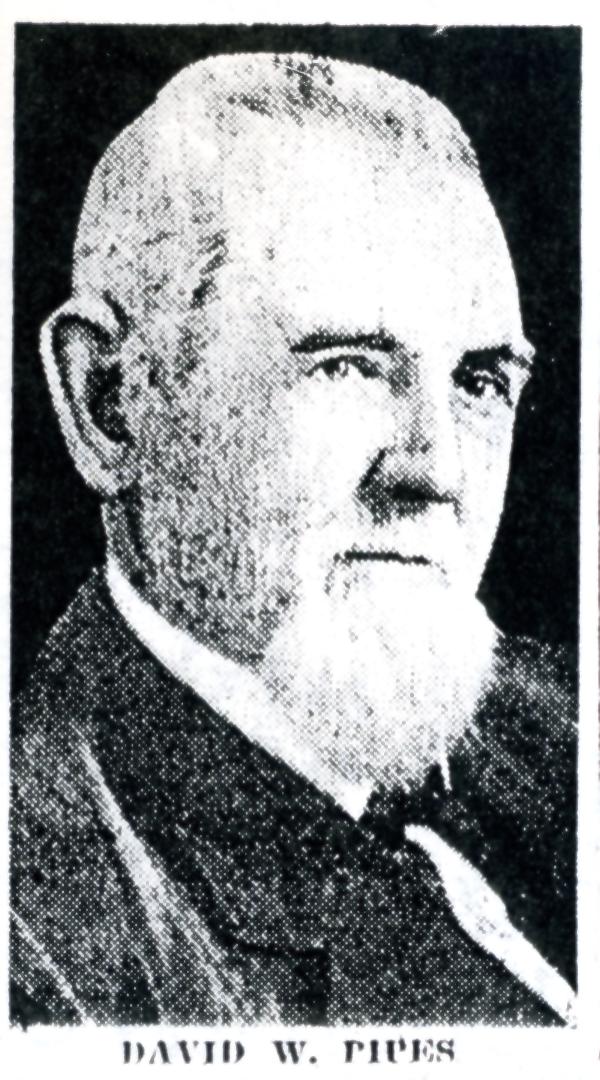
David Washington Pipes
1845 - 1939
A man of many accomplishments, a man who made many impressions in the chapters of our country's history and a man who deserves a special place of his own on the Pipes Family History Web site. This section will focus on articles, links, pictures and stories of David Washington as well as his descendants.
Lets take a minute to put David Washington in proper historical context and also in the proper context of our own family history. The oldest known Pipes ancestor in the United States at this point in time was born in about 1712 and was named John Pipes. [we call him Senior, to differentiate him from his son John Junior] We do not know if he was born on this continent or if he was born in Europe. He first appears in 1735 in Bristol County, Massachusetts to marry Susannah Hathaway, young daughter of Abraham Hathaway. Shortly after that marriage, Abraham moves his family to the wilderness of Morristown, New Jersey and John Sr and his new wife Susannah are part of the family contingent. In the next 20 years, John and Susannah have 5 sons and a daughter that we are currently aware of.
Those sons are the 5 main branches of the Pipes family and are lead by: John Jr, Windsor, Abner, Sylvanus and Phillip. The daughter was named Susannah after her mother and married a man named Samuel Carter. By 1771 John Sr. has left Morristown and relocated by way of the Great Wagon Road to Surrey County, North Carolina. By 1780, sons Windsor and Abner have made their way south to Spanish territory that would become Adams County and Natchez, Mississippi.
Our man David Washington Pipes was born in Louisiana in 1845, the grandson of Windsor Pipes. He was the youngest son of his father David, and may be the youngest of all 50 of Windsor's known grandchildren. David Washington's father, also named David, was an accomplished man in his own right and had been a soldier with Andrew Jackson in the Battle of New Orleans in the war of 1812. The Father, David, was born before 1790 In Mississippi and by 1821 had relocated to the Felicianas in Louisiana territory and married. There he built Beech Grove Plantation, a vast amount of acreage for farming and was a major landowner and slave holder in that part of Louisiana. David Washington writes in his memoirs many years later about being born into and growing up in that large plantation family. He paints a warm and glowing picture of the times and the people and their way of life. I do not know the size of Beech Grove Plantation in the 19th Century, but in 1933 Tax Lists it is stated to be 5262 Acres.
David Washington was legally, never a slave holder, because he was about 17 years old when he joined the Confederate Army and reached his majority age after the war was over but he returned to the farm after the war and helped to put it back into operation using his wits and without slave labor. He was a member during the war of the well known Washington Artillery and was present in many famous battles and amazingly was in the battery that fired the first cannon shot on the Third day at Gettysburg preceding Pickett's charge.
He was to lose his father in 1873 and inherited a portion of the property and proceeded to become a very successful businessman, banker, politician and was prominent in Louisiana Society. Married twice, he had 4 children by each of his wives and 33 grandchildren.
Later in his life he removed from the countryside and built two beautiful homes in the Garden District in New Orleans and became something of a celebrity, noted for his accomplishments, his advanced age, his wealth and his appearance in many newspaper articles describing his ancestry, his war adventures and his sweeping view of history. He famously made an appearance in Ripley's "believe it or not" for his longevity and the fact that he and his father had lived under the administrations of every US president to that time during the Roosevelt period. He was also often shown with a drawing of his father and the sword that his father used in the Battle of New Orleans. At his death in 1939 it was noted that he had been the last surviving soldier in Lee's Army of Northern Virginia.
So let us jump ahead in time to 2009, when our cousin Tara Harl made a trip to New Orleans to visit with some of David Washington's Descendants and to report on her observations made while looking back across nine generations.
Across Nine Generations---and two centuries, two brothers, "meet again"
"But for one or more reasons, either of us will ever know, my family line and his, both "Pipes", descended quite differently. Over lunch that day in New Orleans Spring 2009, the 9 generations of time, geography, and quite different socio-economic backgrounds, seemed to melt as we shared our stories and smiled at this incredible family, the Pipes. Their uncanny ability to be in the most interesting of historical times, while traversing uniquely diverse paths of genealogy, solidified the American story to both of us. We are the product of the very history of this country, literally.
My line descended from John Pipes, Jr. through a number of family names---Gray, Harris, George, Jones, Harl, until myself, Tara Harl. Since "grandpa" came home from the Revolutionary War and settled in Perryville, KY, we have mostly been poor farmers migrating across various states in the Midwest. Wearing Blue in the Civil War, we didn't tend to send our children to higher educational opportunities (mostly due to our lack of economic and social opportunities) until my generation, and rarely entered the political arena other than to vote.
His line descended from John's brother Windsor Pipes who moved to Louisiana after the war, and until his mother married a Borah, he might have carried the Pipes name too; he did grow up in a "Pipes" mansion in New Orleans. His people wore gray in the Civil War, always valued education for their children (except for the daughters who only got to be "finished"--- until his sister rebelled), and seemed to be in the political arena from the moment they entered Louisiana. In fact they still are, as the cousin I had lunch with that day, was the lead preservation attorney who saved the French Quarter from the U.S. Interstate system in the 1960s. I knew something was up earlier that morning at the research library when I mentioned a time crunch for a luncheon appointment with my cousin Bill Borah. All eyes looked up from their desks.
So there I sat, with my 9th cousin, we think, at lunch in one of the most elegant restaurants in the French quarter. He only "had time for lunch that day, his treat". I left his home at nearly midnight that night after another incredible French Quarter meal, and a long "hug across time". As my cab drove away I knew my search for "roots" which began in High School, had brought me some answers. I finally understood why this region had always "haunted" me.
I had been to the area over a dozen times in my life; once within three miles of the family plantation up the Great River Road and once within a block of the New Orleans' mansions. Yet each time I left the area, I felt incredibly homesick. I knew somehow I belonged here too. I was a lifelong Civil War "nut", and yet that day chatting with Bill, the meaning of the war hit me harder then any visit to Gettysburg ever had. I understood to my very soul why those battlefield visits had always bothered me too, for I had stood on the very ground Pipes had fought to annihilate each other on.
Flying out that weekend over the Mississippi River, I looked down knowing I would come back again, as I always did, but first I had to get Mrs. Sarah Munson Pipes to agree to that telephone interview. She was the only one left with memories of--- "Cousin David, you know, he had been in the Washington Light Artillery out of New Orleans. They were in Pickett's charge at Gettysburg and part of the Stonewall Brigade". Cousin James Milton Pipes had been at Gettysburg too, in the wheat field with the 140th Pennsylvania infantry, winning the Medal of Honor. He went home to be a farmer. David went home to become one of the richest men in Louisiana. Had to love these Pipes!
I like to believe when Bill and I met that day we somehow reconnected John Pipes Jr. and his brother Windsor. I wondered when and how the brothers had said their last good-byes? Did they ever wonder what became of each others descendents? Would they be amazed at the paths their individual lines had taken? And , would they smile to know we had "brought them back together again" via what we sensed that day---a truly thin veil of time."
Tara Harl 2009
Plantation Homes of Old Louisiana
In 1971 Doctor Herman Seebold wrote a book about the history of some of the families and plantation homes of Old Louisiana. I have excerpted parts of chapter ten and added several of the pictures and illustrations that I have in my files to make a picture of the times.
OLD LOUISIANA PLANTATION HOMES
AND FAMILY TREES
By
Herman de Bachelle Seebold, M.D.
In Two Volumes Volume Two
PELICAN PUBLISHING COMPANY Gretna 1971
chapter X.
PIPES FAMILY.
JOHN
PIPES was the father of four sons, born in Philadelphia, Pa.
The family dating to Colonial Days in America. The sons
were Windsor, John, Philip and Abner. Windsor and Abner
left Philadelphia, going to what is now Illinois, and about 1780 removed to
Adams County, Miss., at that time territory under
the Spanish rule. According to family records, from these two
brothers all of the families bearing the name Pipes living in Louisiana,
Mississippi, and Texas descend. John went to Georgia where he settled, and Philip to Missouri in 1811 where he located.
" [Note:
I cannot let it pass but to note that the information in the above paragraph is
based on family legend and mythology but is not factual.] There were 5 sons,
Sylvanus being excluded from the list above. They were all born in Morristown,
Pa. between 1739 and 1760. Windsor was in Pennsylvania in 1771 and then Kentucky
in the late 1770s and migrated to Mississippi from there in 1780. Abner was in
N. Carolina with his father and migrated to Mississippi from there about the
same time(1780). John Pipes Jr. and his brothers Sylvanus and Phillip migrated
to N. Carolina after 1770 and then on to Kentucky before 1795. Phillip migrated
on to Limestone Co. Alabama, and Sylvanus moved to Missouri after 1810 and died
there with his children. John Jr.
stayed in Central Kentucky and died there in 1821
Windsor
Pipes, son of John Pipes, was married twice, his wife by his second marriage was
Miss Jane McAfee, born on March 1st, 1745, and she became the mother of five
sons and three
daughters, and died Sept. 12, 1811. Her children were named
as follows: Abner Pipes, John Pipes, Joseph Pipes, David Pipes,
Charles Pipes, Jane Pipes, Polly Pipes, Lettie Pipes.
David
Pipes was born in what is now Adams County, Miss., on May 14th, 1790. He spent
his early life in the Natchez country,
and at the Battle of New Orleans served with the Adams County
cavalry troops, a memento of that day being a saber still in
the family, that was worn by David Pipes at this battle. When grown
to manhood he removed to East Feliciana Parish, La., and became
a planter. His success was such that by the time the Civil
War was declared in 1861, he was considered one of the wealthiest
planters in the section. He studied his land, his slaves, and
all the things that pertained to the plantation, and kept up with the latest improvements, etc. He did not participate very actively
in public affairs, although he was a member of the Whig party,
but devoted his energies to his plantation, Beech Grove. [pictured below] From
this place in true Christian manner he dispensed many a worthy charity,
and there church festivals were held in order to aid
the Church fund.
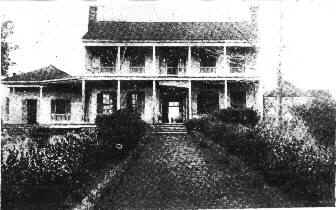
His
first wife was Martha Worthington, five children from this
marriage bear the following names: Alexander, Mary Hill, Henrietta, Amanda, and
Emily. His second wife, Mrs. Amanda Collins,
nee Dunn, was born in South Carolina on July 30th, 1800, a daughter of Captain Henry Dunn, a prosperous planter of South Carolina.
While quite young the family moved to Mississippi where Amanda married Dr.
Collins. Their children were Zaterina and Ophelia. David Pipes and Amanda Dunn
(Collins)
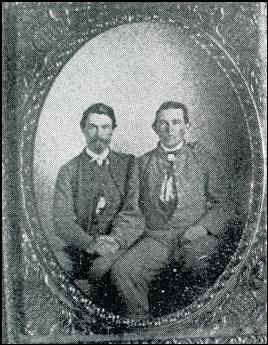 became
the parents of two sons, William H. Pipes and David W. Pipes.
became
the parents of two sons, William H. Pipes and David W. Pipes.
The oldest son, William H. Pipes, was a student at the University
of Virginia at the time that the War Between the States was declared. He
immediately left college and entered the
army of the Confederate States of America. [15th Tennessee Infantry] His army record shows
he served with gallantry and distinction; he was adjutant-general
on the staff of General Bates in the Army of Tennessee. [David is pictured on
the right in this old Civil War photo. The person on the left may be his
brother, William Henry.]
David
Washington Pipes was reared in East Feliciana Parish and
attended Oakland College in Mississippi. After the outbreak of
the Civil War, he returned from college to assist in the management
of his father's plantation and business. He begged his family
to let him go to war until finally in 1862 when he was 17 years
of age, he left for Virginia with his body servant, Henry Richardson.
Reaching Richmond he met his nephew, John Stone, and many of his
friends. He at once enlisted in the 4th Company, Battalion,
Washington Artillery, from New Orleans, at that time with
General Robert E. Lee in the Army of Northern Virginia. David
W. Pipes remained with that famous organization until the close
of hostilities, taking part in all the actions in which that battalion
was engaged, leaving an honorable record to be added to those already attached to this distinguished family.
Like
many of his friends, after hostilities Mr. Pipes resumed the
life of a planter on the large plantation, this time on his own account. By his
energy, keen judgment and thrift, he became successful in every enterprise he
undertook ,and when he retired as
a planter he was considered one of the large landowners of Feliciana
Parish, the greater part of his holdings being highly cultivated.
In 1888 he was elected as an anti-lottery member to represent the Feliciana Parish in the State Legislature and his constituents
were thoroughly satisfied with his activities. He fought
the Lottery Company bitterly and was one of its most intelligent and persistent opponents. When the proposition to re-charter
the company was finally defeated, no one was happier than he. He was elected to the State Senate in 1892, and also served
in the Constitutional Convention of 1898.
David
W. Pipes married Miss Anna Key Fort, daughter of Mr.
William J. Fort, a wealthy planter of West Feliciana Parish, La.
Their children are: David W. Pipes, William Fort Pipes, Sarah
Randolph Pipes, Randolph Windsor Pipes.
Sarah
and Randolph were named
for their
grandmother, Sarah Randolph, daughter of Judge Peter Randolph of Virginia
and Mississippi, and wife of
Colonel Tignal Jones Stewart of Mississippi,
the grandmother that Mrs. Pipes lived with during most of her childhood. The
three Pipes boys were educated at Washington and Lee University, and the
daughter at Newcomb College of Tulane
University. During his
lifetime while a resident of Clinton,
La., Mr. David Pipes was a member and elder of the Presbyterian
Church of Clinton. He
was a staunch Presbyterian, firm in his religious beliefs and faithful in
the discharge of the duties and responsibilities that this implies.
Mrs.
David Pipes, always a social leader, continues her social activities,
living again in her grandchildren her social triumphs of
her younger years. Stately, gracious, distinctly patrician looking,
she has inherited from her illustrious ancestors all of those traits
of character that come only through generations of good breeding.
Her handsome home in the beautiful "Garden District",
like her former lovely old plantation home, is forever gay with
the friends of the family who make of it a joyous meeting place.
She is now the recognized head of the family or clan which comprises
the following families: Fort, Stewart, Pipes, Randolph, and
Butler.
TOWN HOUSE OF THE DAVID W.
PIPES FAMILY.
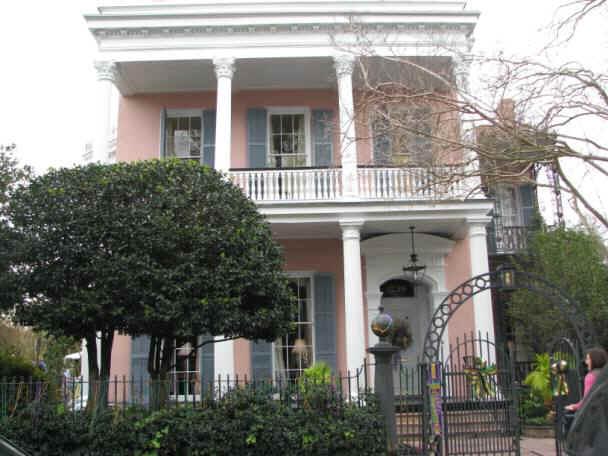
The
handsome city home of the David W. Pipes family is one of the
most attractive in the city. Built when the beautiful "Garden District"
was in the making and splendid mansions of the Greek Revival and similar architectural styles were being constructed then
as with many that have remained, it is as attractive as when originally
built. This home, among the finest, is in every way typical of the home of the cultured patricians that chose this area
for their residences.
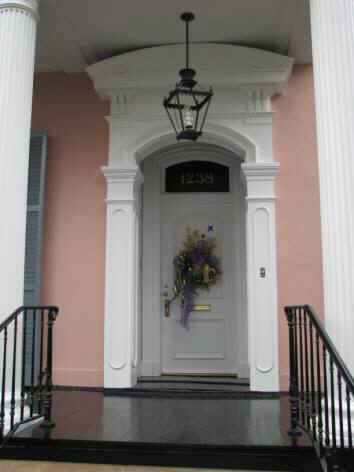
Set
in great gardens, surrounded by splendid oaks, magnolias and
other beautiful trees that form leafy bowers at every turn, for years
this lovely old mansion has been the home of the David Pipes
family—one of the most distinguished plantation families in
the entire Southland. This old home is quite similar to the plantation
houses, having large rooms and high ceilings, wide hallways and roomy porches, making it an ideal home for entertaining
on a large scale. Most of the splendid examples of massive rosewood and mahogany
furniture from the ateliers of Signorette and Prudence Mallard feel quite
at home in these large rooms, for much of it
was made to order for the Fort and the Pipes families,
ancestors of those who enjoy these beautiful things today. Fortunately the Pipes family had removed to this fine old home
before their old family plantation home burned. On entering
the hallway one notes at once the fine collection of silhouettes, picturing
the celebrities of a vanished day. In the drawing rooms and other rooms
of the house one finds some of the finest crystal chandeliers in the South, and
the other furnishings of this fine old home
are in keeping. Since occupied by the Pipes family it has
been a scene of constant entertaining, a number of debutantes, granddaughters
of Mrs. David Pipes have made their debut here.
The
latest debutante to make her bow to society being a lovely granddaughter,
Miss Sarah Pipes, pictured in her ante-bellum costume worn at the "Gone with the Wind" dance given some time
ago.
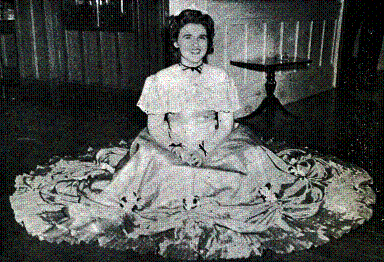
FORT
FAMILY OF CATALPA PLANTATION
West
Feliciana Parish, La.
Originally
le Fort family came from France to England at the time
of the "Revocation of the Edict of Nantes" when their religious
privileges were taken from them. Later they came to America.
Mrs.
William Fort, a widow with three sons, came from the Carolinas
and settled in the Felicianas in the early part of the 18th
Century. Their first home, built on Magnolia Plantation near
the river, was a large roomy two story house built of brick, with all of the
comforts to be found in plantation homes of that period.
Shortly
after settling in Feliciana, one of Mrs. Fort's sons died.
He had returned to Carolina with his cousins the Barrows, for
more slaves, and on the way he contracted a fever from which he
never recovered. Her second son William married the beautiful
Mary Johnson, also a cousin of the Barrows, who had been sent
to Philadelphia for her education. They had but one child, William
Johnson Fort of "Catalpa Plantation". He married Sally
Jones Stewart, whose mother was Sarah Randolph, daughter
of Judge Peter Randolph of Virginia and Mississippi, and her father
was Tignal Jones Stewart, son of Duncan Stewart of Scotland. Duncan
Stewart was the first Lieutenant Governor of Mississippi. The old Stewart
plantation manor, "Holly Grove", was
a massive Colonial building with large brick pillars, and galleries
on both upper and lower floors. Its many rooms were filled
with choice pieces of mahogany and rosewood furniture, (today considered
antiques fit for a museum), family portraits, old silver and rare books, which
enhanced its beauty—certainly a home of real
charm.
From
the marks on one of the bricks, authorities state the house
was erected one hundred and fifty years ago. All of its beauty is now
gone, except the old wide galleried house and the cemetery near by where rest
the remains of the original owners. This
little cemetery, overgrown by flowering trees and vines which
climb over the handsome monuments, in olden days was as beautiful
with flowers as was the immense garden filled with rare
flowers and fruits. The Forts had three very large plantations,
one of the sugar plantation had the largest sugar house in the
state in ante-bellum days. The ruins of this old brick building
can still be traced by the brick foundations, not far from the main dwelling on
Catalpa Plantation.
Acknowledgments:
The
pages from Chapter 10 of the Seebold book have been sent to me from several
sources, among them are Tara Harl and Glenny Pipes Warzeski. The photo of Sarah
Randolph Pipes is from the pages of the book as well as the photo of DW Pipes in
the Army. The photos of the House in the Garden District were taken By Tara Harl
in 2009. The Beech Grove plantation photo is from an original newspaper picture
and again has been sent by several sources. [RJ Pipes 2009]
Links to articles of importance:
I have several more articles and pictures to post here and will do so in the near future.
David
Pipes' memoirs
A Drawing of David Washington Pipes as a baby
Ripley's "Believe it or not" Article
A letter written By David Washington Pipes in 1928
A brief Article about David Washington Pipes' Civil War Service
A Genealogy Report for David Washington Pipes
A Picture of David Washington Pipes in mid life
David Washington Pipes' Obituary from The Times-Picayune
David Washington Pipes, "Oldest Voter" Picture
Beech Grove Cemetery Pics sent by Lanaux and Randolph Pipes in 2000. David W Pipes is not buried here.
NEW! Added June 2010 An audio recording of an interview with Sarah Pipes Munson, 2010
NEW! Added June 2010 Photos from Gettysburg - The Washington Artillery on the 3rd day at Gettysburg